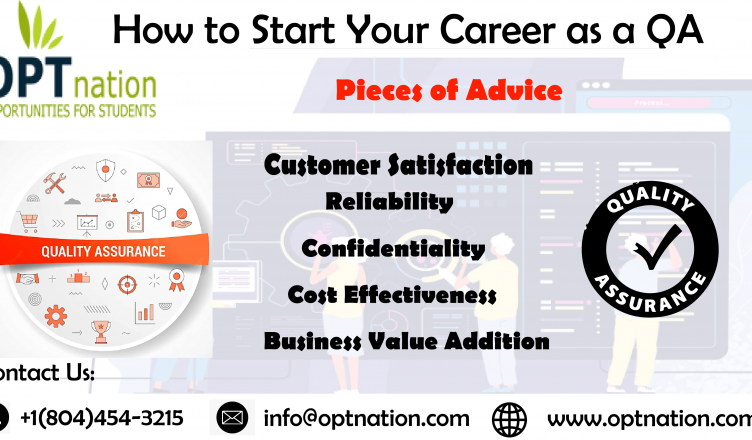To have a successful career in the quality assurance field, you should have the right tools and advice. Here are seven words of wisdom from experienced professionals in the QA industry that will help you start your career on the right track.
1. Get a Degree in Computer Science or a Related Field:
Can you perform automation testing services without a degree? The answer is yes, but to snag a job that pays well, you should have vast experience. To be hired, many companies might require some form of professional training or education.
In other words, if you want to break into tech through this route, consider getting a degree in computer science or a related field. It will give you a massive edge over those who didn’t attend school.
Even better, you will gain the technical knowledge and skills to be successful in this career. Even if you’re a newbie, your learning curve is less steep.
2. Get Experience Working with Software:
Many schools that offer education or certification also provide internships. This allows you to apply the theories and concepts you’ve learned. But you can also pursue other routes, especially if you don’t possess a degree:
- There are many open-source projects that always need help. By contributing, you gain the valuable experience of working with a team and codebase.
- Look for junior- or entry-level positions. You don’t need years of experience to get started in this field. Start by looking for junior or entry-level positions in software development or QA.
- Apply for a part-time job. This could be a great option if you want to get your foot in the door and don’t mind working part-time.
Get a mentor. A mentor is someone who can help you learn and grow in your career. Some allow you to work in their business to give you some experience. If you don’t have anyone in mind, look for programs that pair them with mentees.
3. Learn about Different Testing Methodologies:
Once you have experience working with software, learn about different testing methodologies. You can assess platforms or applications in many ways, each having its advantages and disadvantages:
- Automated testing. This is where you write scripts to test an application automatically. It’s great for regression testing (checking if there are any bugs after a new release) and can be used to test frequently changing areas of an application. However, it can be expensive to set up, and you need someone with coding skills to maintain the scripts.
- Manual testing. As the name suggests, this is where you test manually, without any scripts. It’s a great way to test if an application is user-friendly and easy to use. However, it’s time-consuming and not suitable for regression testing.
- Non-functional testing. This tests how well an application performs in terms of factors such as speed, scalability, and security. It’s vital to ensure that an application can handle the load (traffic) and still function properly.
4. Choose a Specialty:
You’ve already gained some experience and have tried using various tests. Perhaps you can specialize in one or two types of QA.
Note that specializing is not mandatory. However, if you want to further your career and get better-paid positions, you should show companies that you’re an expert in a particular area and can add value to the organization.
Here are some examples of common QA specialties:
- Performance testing. This tests an application’s speed, scalability, and stability under load.
- Security testing. It identifies any security risks in an application and suggests ways to mitigate them.
- Usability testing. This assesses how user-friendly an application is.
- Compatibility testing. It checks if an application is compatible with different browsers, devices, operating systems, etc.
5. Join a Professional Organization:
Joining a professional organization, such as the Association for Software Testing or the American Society for Quality, offers many benefits, such as:
- Training and certification programs. They can help you stay updated on the latest trends and technologies.
- Conferences and events. You can network with other professionals and learn from the best in the industry.
- Volunteering opportunities. You can give back to the community and help others in their career journey.
6. Always Upskill:
Even if you’re already working in QA, always look for ways to improve your skills. The software development field constantly changes, so you must keep up with the latest trends and technologies.
Here are some ways to stay up-to-date:
- Read industry news and blog posts. This will help you learn about new trends and technologies.
- Take online courses. There are many free and paid courses available online. Choose one that covers a topic you’re interested in learning more about.
- Do side projects. Use your spare time to work on personal projects. This is a great way to practice your skills and learn new technologies.
7. Don’t Be Afraid to Ask for the Job:
Are you already in a software development company? If you want the role so badly, consider reaching out to your boss and asking for it.
Many people are afraid to request to have another role, apply for a different position, or be assigned to another department. But if you don’t ask, you’ll never know.
The worst that can happen is they say no. But even if they do, it’s not the end of the world.
You can always use the time to upgrade or hone your skills on the side and re-apply once you feel readier. If your company still doesn’t want to offer it to you, you now have the expertise to try even an entry-level position someplace else.
Conclusion:
A career in QA is a great way to enter the software development industry. You can succeed in this field with the right skills and attitude. Follow the tips above, and you’ll be on your way to starting a rewarding career in quality assurance.

